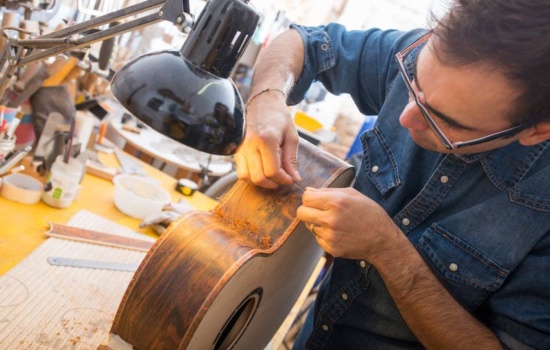A luthier is a guitar maker and guitar repairer.
Music Career Finder
Survey Start
Luthier School: Should You Go?

- A luthier makes and repairs guitars
- The best way to become a luthier it to become an apprentice or assistant to a professional luthier
- Lutherie school can cost between $15,000 and $20,000, plus about $1,000 for luthier tools
- Some things you would learn at lutherie school include contemporary guitar making, setup, maintenance and basic repair, fresh polishing, fretwork, guitar design, and more
- The average salary for a luthier is about $100,000 but it can be as low as $11,000
- Introduction
- What Is a Luthier?
- The Best Way to Become a Luthier
- Is Lutherie School Right for You?
- How Much Does Luthier School Cost?
- The Classes You’ll Take at Lutherie School
- What You’ll Learn in a Basic Physics and Design Guitar Making Course
- The physics of the stringing system
- Intro to the main components
- Tone and intonation
- Nut and saddle
- Guitar bridges
- Neck geometry
- Problem-solving
- Measurements and data collection
- Bridge height and neck relief
- Fretwork and neck design
- What To Expect When You Graduate
- How Much Money Do Luthiers Make?
Most people don’t even know what a luthier is.
So let’s talk about what a luthier does and how you can become one.
What Is a Luthier?
The Best Way to Become a Luthier
People looking to become luthiers typically start out as apprentices or assistants to a professional luthier.
This way, they get hands-on experience, which is important in such a hands-on profession. Plus, you learn to make guitars that you can then play once they’re done.
Most luthiers also go through some sort of higher education or online course. Matt Rubendall, a professional luthier, went to a six-week lutherie school. There, he says, they trained people to work in the big guitar-making factories, like Martin or Taylor.
But he says nowadays, people prefer to spend much more time learning and getting educated to either work for a small guitar shop, start their own luthier business, or just do it on the side.
Hey, what do you think about trying our new Music Career HelperMusic Career Helper really quick? It’s totally free and could help get your career moving fast! Give it a try. It’s totally free and you have nothing to lose.
Is Lutherie School Right for You?
Because a luthier’s salary can be as little as $11,000, it can be tough for some people to justify paying for luthier school.
However, consider how inexpensive an education in lutherie is compared to your typical college education.
So if you love working with guitars, going to lutherie school may be a great choice for you.
How Much Does Luthier School Cost?
If you want to go to an actual lutherie school and take a comprehensive course, tuition could cost you between $15,000 to $20,000, not including the $1,000 or so you’d spend on tools.
You can also go the online course route if you’re looking to save money. There are actually lots of online courses created and curated by professional luthiers.
The cheapest way to learn is by reading books and watching videos online. Honestly, this is probably the least desirable way.
However, it is possible to pull this off if you follow it up with an apprenticeship at a local guitar shop.
The Classes You’ll Take at Lutherie School
At lutherie school, you can select the courses that interest you most and build your own set of skills.
Some examples of classes you may take include:
- Acoustic guitar making
- Electric guitar making
- Bass guitar making
- Contemporary guitar making
- Setup, maintenance & basic repair
- Fresh polishing
- Fretwork
- Guitar design
What You’ll Learn in a Basic Physics and Design Guitar Making Course
Just to give you an example, let’s go through what you’ll learn in a basic luthier course. This would be a 101-level class.
The physics of the stringing system
Here you’ll learn about how to correctly set up the strings, bridge, and guitar top.
You’ll need to know how the whole stringing system works, what string energy is, and how the top converts string energy into audible sounds.
Intro to the main components
Once you know the physics of how a guitar works, you’ll learn about the main components of the guitar.
You’ll learn how to use these components to shape the tone and refine the responsiveness of the guitar.
Tone and intonation
You’ll learn about using the proper scale length (the distance between the nut and the saddle). This is super important in controlling the tones of the final finished guitar.
You’ll also get educated on other aspects related to tone and intonation.
Nut and saddle
The nut and saddle are big factors in the tone of your guitar and its design, especially when it comes to choosing the materials to use.
Guitar bridges
There’s so much to learn about the guitar bridge that you can spend an entire section of a class on it.
You’ll learn how to use the bridge’s full potential to make the guitar more playable and the tone more beautiful.
Neck geometry
The shape of the neck is one of the most important things that determine the playability and intonation of a guitar.
And you’ll need to understand the neck’s geometry and materials.
Problem-solving
If you want to be a successful luthier, you have to develop good problem-solving skills.
You’ll have to find and diagnose problems and also be able to face unexpected issues as they arise.
Measurements and data collection
Being able to collect, measure, and analyze data on your guitars will allow you to get better at making more advanced designs.
Bridge height and neck relief
Knowing the relationship between bridge height and neck relief is another crucial piece of knowledge to have if you want to be a good luthier.
Knowing this allows you to make the most effective adjustments to get the best playability.
Fretwork and neck design
What is it that makes a guitar NOT as playable as it could be?
Knowing the answer to this question (or knowing how to find the answer) is something else you’ll need to know.
What To Expect When You Graduate
After earning an education as a luthier, you’ll most likely want to find an experienced professional who will let you be their apprentice.
From there, you can continue working for a mom-and-pop guitar shop, work for a big-name guitar-making company (like Martin or Taylor), or you could even start your own business.
If you venture out on your own, you’ll probably need to make custom guitars (Rubendall hand makes 6-10 guitars a year) and also do a lot of restorations and repairs. And you’ll most likely need to sell guitars both in-person and online.
Whatever path you choose, you must do it because you love it, not because of the money.
But he says this creates a luthier community that’s super tight-knit, whether it’s a beginner looking to learn more or fellow experts helping each other out.
“If some kid wants to come in, I will show him every single thing I do,” he says. “That’s what’s great about instrument makers, I think. A lot of them are really eager to help people and offer advice.”
He goes on to say this isn’t a skill you just pick up. It’s not something you should just Google once and feel like you’ve got it down. It’s a craft that takes a lot of TLC.
“I think people are looking for a quick fix, the internet way of ‘I can learn this — there must be a step A-Z [tutorial],’” he says. “But that’s not the case.”
How Much Money Do Luthiers Make?
In the United States, the average income for a luthier is about $100,000 per year, but it be as low as $11,000.
A luthier’s income can really vary depending on the situation. It depends on things like how skilled they are, their reputation, where they’re located, and what kind of luthier work they do.
Being a luthier is more about the love of the craft rather than trying to make a bunch of money.
If you’re just starting out, you might not make a ton of money right away. It takes time to build up your skills, reputation, and client list.
But as you get more experience and people start recognizing your talent, you can start charging higher prices for your work.


